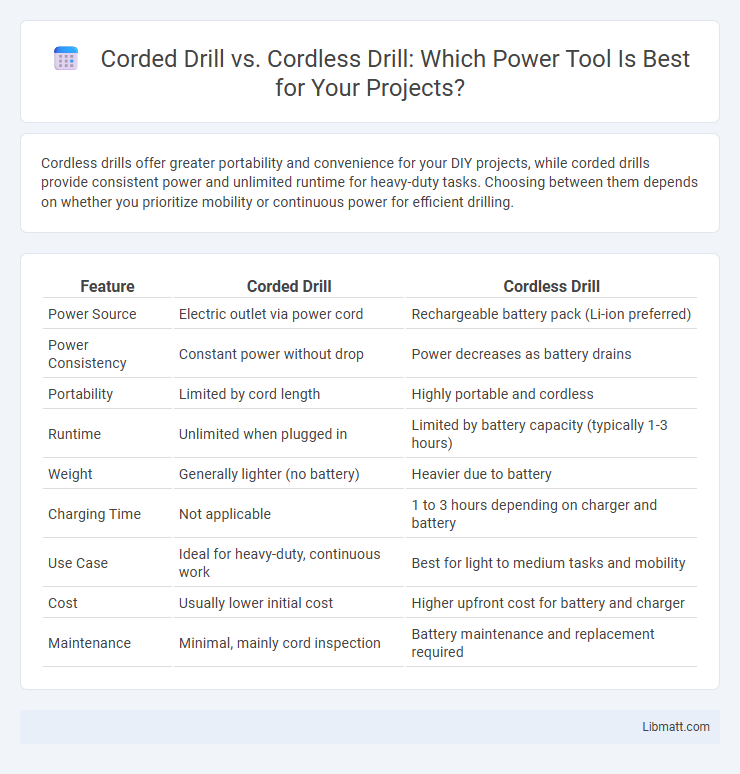Cordless drills offer greater portability and convenience for your DIY projects, while corded drills provide consistent power and unlimited runtime for heavy-duty tasks. Choosing between them depends on whether you prioritize mobility or continuous power for efficient drilling.
Table of Comparison
| Feature | Corded Drill | Cordless Drill |
|---|---|---|
| Power Source | Electric outlet via power cord | Rechargeable battery pack (Li-ion preferred) |
| Power Consistency | Constant power without drop | Power decreases as battery drains |
| Portability | Limited by cord length | Highly portable and cordless |
| Runtime | Unlimited when plugged in | Limited by battery capacity (typically 1-3 hours) |
| Weight | Generally lighter (no battery) | Heavier due to battery |
| Charging Time | Not applicable | 1 to 3 hours depending on charger and battery |
| Use Case | Ideal for heavy-duty, continuous work | Best for light to medium tasks and mobility |
| Cost | Usually lower initial cost | Higher upfront cost for battery and charger |
| Maintenance | Minimal, mainly cord inspection | Battery maintenance and replacement required |
Introduction to Corded vs Cordless Drills
Corded drills deliver consistent power and unlimited runtime, making them ideal for heavy-duty tasks that require sustained drilling performance. Cordless drills offer mobility and convenience with rechargeable batteries, suited for light to medium tasks and working in areas without easy access to power outlets. Choosing between corded and cordless drills depends on project demands, emphasizing power needs, portability, and battery life.
Power and Performance Comparison
Corded drills consistently deliver higher and more stable power output, making them ideal for heavy-duty tasks that require continuous high torque. Cordless drills offer enhanced portability and convenience but often have limited runtime and reduced power compared to their corded counterparts, especially under prolonged use or demanding applications. Battery technology advancements improve cordless drill performance, but corded models remain superior for maximum power and uninterrupted operation.
Portability and Convenience
Cordless drills offer superior portability and convenience due to their battery-powered design, allowing you to work freely without needing a power outlet. Corded drills, while providing consistent power, are limited by the length of their cords, which can restrict mobility and cause inconvenience on large or outdoor projects. Your choice depends on whether you prioritize flexibility and ease of movement or uninterrupted power supply for extended use.
Battery Life vs Continuous Operation
Corded drills provide continuous operation without the risk of battery depletion, making them ideal for prolonged tasks requiring consistent power. Cordless drills offer the flexibility of mobility but are limited by battery life, which varies based on battery capacity and usage intensity. Your choice depends on whether uninterrupted power or portability is more crucial for your projects.
Versatility and Applications
Corded drills deliver consistent power, making them ideal for heavy-duty tasks such as drilling into concrete or metal, while cordless drills offer greater portability and ease of use in tight or remote spaces. Cordless models are favored for quick jobs and projects requiring frequent movement due to their lightweight design and rechargeable batteries. Versatility in applications is determined by battery life for cordless drills, whereas corded drills excel in prolonged, high-torque operations without interruption.
Durability and Maintenance
Corded drills generally offer greater durability due to fewer moving parts in the power delivery system and a constant power source, reducing the risk of overheating and battery degradation. Cordless drills require regular battery maintenance, including charging cycles and eventual battery replacements, which can affect long-term reliability. High-quality corded models often withstand heavy usage and harsh conditions better than their cordless counterparts, making them ideal for demanding construction and industrial applications.
Price and Cost Efficiency
Corded drills typically offer a lower upfront price compared to cordless models, making them more cost-efficient for users with frequent, long-duration tasks. Cordless drills require battery replacements and chargers, which add to the total cost over time, but they provide greater portability and convenience. For budget-conscious buyers prioritizing extended use without mobility limitations, corded drills present a more economical choice, while cordless drills balance initial cost with flexible operation.
Safety Features and Considerations
Corded drills typically offer a consistent power source, reducing the risk of sudden power loss that could lead to accidents, while cordless drills rely on battery charge, requiring regular monitoring to avoid unexpected shutdowns during use. Both types often include safety features such as electric brake systems to stop the bit quickly and insulated grips to prevent electric shock, but cordless drills may offer added convenience with lower voltage options for safe operation in tight or wet conditions. When choosing between corded and cordless drills, consider your safety priorities, the environment in which you'll work, and your ability to maintain the tool's power and battery life effectively.
Environmental Impact
Corded drills have a lower environmental impact due to consistent energy efficiency and the absence of battery disposal concerns, while cordless drills rely on rechargeable batteries that contribute to electronic waste and require energy-intensive production. Battery recycling programs help mitigate some environmental effects, but the extraction of lithium and cobalt for batteries remains resource-intensive and ecologically damaging. Choosing a corded drill can reduce your carbon footprint and minimize hazardous waste compared to frequent battery replacements in cordless models.
Which Drill is Right for You?
Corded drills offer consistent power and unlimited runtime, making them ideal for heavy-duty projects requiring high torque. Cordless drills provide greater mobility and convenience, perfect for light to medium tasks or working in locations without easy access to power outlets. Your choice depends on the balance you need between portability and power based on your specific drilling needs.
Corded drill vs cordless drill Infographic

 libmatt.com
libmatt.com